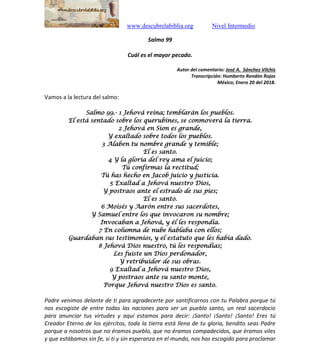
David was known as a man after God's own heart, a mighty warrior and the beloved king of Israel. But he was also a human being prone to sin, just like any one of us. In Psalm 51, we see David pleading with God to create in him a clean heart. This heartfelt prayer holds deep meaning and serves as a powerful lesson for all believers. By exploring the context and significance of David's plea, we can gain insight into the importance of a clean heart and the transformative power of confession and forgiveness in our spiritual lives.
¿Qué significado tiene pedir un corazón limpio a Dios?
When David asks God to create in him a clean heart, he is acknowledging his need for cleansing and forgiveness. A clean heart symbolizes purity, righteousness, and a deep desire to follow God's commands. David recognizes that his heart has been tainted by sin, and he longs for a fresh start, a new beginning with God. This prayer is not just an admission of guilt, but also a plea for transformation, for a heart that is aligned with God's will.
Furthermore, asking God for a clean heart reflects David's understanding of God's role as the ultimate source of purity and holiness. He recognizes that true transformation is only possible through divine intervention. By surrendering his heart to God and trusting in His cleansing power, David demonstrates his faith and reliance on God's mercy and grace.
David and Bathsheba: A Tale of Sin, Confession, and Restoration
The story of David and Bathsheba is a vivid illustration of the desperate need for a clean heart and the power of confession in finding restoration. David, being the king, used his power to have an affair with Bathsheba, the wife of Uriah, one of his loyal soldiers. To make matters worse, David eventually arranged for Uriah's murder to cover up his sin.
David's actions were not only a betrayal of his own moral compass, but also a betrayal of his relationship with God. In this dark moment, David's heart was far from clean. His sin had stained his soul, leaving him in a state of guilt, shame, and separation from God.
However, when confronted by the prophet Nathan, David is deeply convicted of his sin. He immediately realizes the gravity of his actions and the need for repentance. As a result, David pours out his heart in Psalm 51, a heartfelt prayer of confession and plea for a clean heart.
 Qué es la Cúpula de la Roca en Jerusalén
Qué es la Cúpula de la Roca en JerusalénGod's Response to David's Prayer
God's response to David's prayer is a remarkable demonstration of His love and mercy. Despite the severity of David's sins, God forgives him and offers him a pathway to restoration. David's heartfelt confession and genuine repentance touch the very heart of God, and He responds by blotting out David's transgressions, cleansing him from sin, and restoring the joy of salvation.
This powerful response not only restores David's relationship with God, but it also serves as a reminder to all believers that no sin is too great for God's forgiveness. It is a testament to God's extraordinary grace and His willingness to redeem those who sincerely seek Him.
The Importance of Confession in the Pursuit of Spiritual Cleansing
David's sincere confession before God highlights the significance of admitting our sins and seeking forgiveness. Confession is not just a mere acknowledgement of wrongdoing; it is a humbling act that opens the door to healing and restoration. When we confess our sins to God, we acknowledge our need for His forgiveness and cleansing. It is through this process that we invite God to create in us a clean heart.
Confession also plays a vital role in our spiritual journey. It allows us to come face-to-face with our sins and the consequences they bring, leading us to genuine repentance. Only when we acknowledge our sins and seek God's forgiveness can we experience the true freedom and joy that comes from a heart that is clean and connected to God.
Furthermore, confession fosters humility and vulnerability in our relationship with God. It reminds us that we are not perfect and that we are in constant need of His grace and mercy. It strengthens our faith and deepens our reliance on God's transforming power.
Conclusion
The psalmist's plea, "Create in me a clean heart," reflects David's deep desire for spiritual renewal and restoration. It serves as a reminder for us to examine our own hearts, to seek forgiveness for our sins, and to invite God to cleanse us from all unrighteousness. Just as God responded to David's plea with grace and mercy, He stands ready to forgive and restore us when we turn to Him with repentant hearts.
Lee También Qué significa gustar y ver que el Señor es bueno en Salmos 34:8
Qué significa gustar y ver que el Señor es bueno en Salmos 34:8May we learn from David's example and surrender our hearts to God, seeking His cleansing power and embracing the transformation that comes from a heart that is truly clean and devoted to Him.
Deja una respuesta










También te puede interesar: